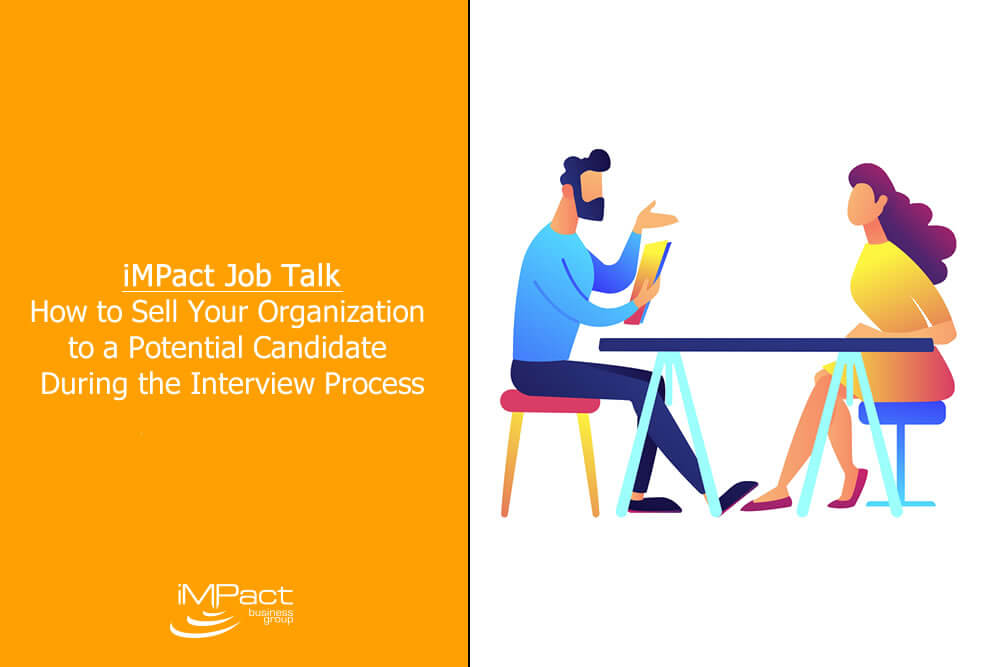In this episode of Job Talk, we talk to iMPact’s owner Matt Peal, and Account Manager Drew Kunkel about best practices for interviewers to help sell the value of your organization to potential new employees during the interview process.
Sell your company!
Organizations may think they’re the next best thing since sliced bread and that candidates are clawing tooth and nail to get into their company. But even if you’re Amazon or Google, this is still a candidate-driven market, and candidates have options. Culture, work-life balance, growth potential, benefits, etc are all important factors to a candidate. Do your homework and gather as much information as you can about the candidate to know what their motivators are. Ask them if they are interviewing anywhere else so you know who you’re up against. This will help you tailor your brand message and highlight the parts of your offering that will best suit the candidate’s needs.
Don’t sugarcoat it
You should be honest about all aspects of the company culture, position, environment, and growth potential so that you’re not wasting your time or theirs. You’re better off having a candidate not accept a job offer, than joining your team just to discover that things weren’t what they had anticipated and quitting – leaving you to have to start the job search all over with the additional time and cost associated with that. But there’s a fine line to walk. Just because your position or day or current situation may be stressful – try and take yourself away from that and look at it from a 3rd person point of view. Don’t project your personal frustrations that may be directly related to your own role and situation onto the candidate.
Avoid distractions and interruptions
Keep your eyes on the interviewee and offer them your undivided attention. Don’t have a second screen/laptop and be checking emails on the side. Don’t have any others coming in/out of your office, and make sure your phone is on silent. You want to make sure the interviewee feels that their time is valued and that you are genuinely interested in learning about them.
Be prepared
Don’t wing it! Be prepared with questions and goals going into the interview. Make sure to read through their resume and cover letter (write-up/highlights if sent from an agency) before talking with them. Many hiring managers feel that since they’re experts in the role or have been at the company for a very long time, that they can just wing the interview and judge them based on feel and whatever questions come to mind. It comes off as disrespectful when the interviewer starts the interview, picks up the resume, and starts reading it over to get a feel for their background before starting the conversation. Just like you would expect the candidate to have done research on your company prior to the interview, the candidate expects that you’ve given their resume a thorough read-through before chatting as well.
Make it a conversation
Describe the role, culture, and ideal candidate. Don’t expect that candidate to lead the entire interview and sell themselves the entire time. The candidate should sell themselves – no doubt, but a good interview should be a back-and-forth conversation on both sides to make sure it’s a good fit.
Small talk
Don’t have too strict of an interview process. Be prepared but don’t just rifle off questions from a script/template and leave it at that. Candidates want to have some real insight into your personality to make sure you’re the type of person they would want to work with. Small talk is okay! Keep small talk to topics of common interest that you may have discovered during your research. Maybe you both went to the same school, have similar interests in sports or same sports team and so on. Stay away from discussing politics, religion or other emotionally charged topics.
2nd round interviews
If this is a second-round interview, make sure you talk with the person that originally interviewed them (or agency) beforehand. You’ll want to avoid asking all the same questions and have the candidate feel the interview is redundant/a duplication of efforts. Additionally, you can pull some knowledge from the first person and choose some follow-up questions to further clarify things they spoke about in the first round.
Interview process
Be conscious of how long your interview process is from start to finish. 5 rounds and 2 assessments? Those can end up being 1-2 month-long processes and likely candidates will get scooped by a competitor in the meantime. Try to get everyone involved and consolidate it down to 2-3 rounds to stay competitive (if it’s a permanent role). If it’s a contract/temp position, try your best to make it a one-and-done interview as typically the market for contract/temp help moves significantly faster. This is especially true if the candidate is unemployed!
Oddball questions
Don’t ask oddball questions such as “If you could be any animal, what would it be and why?” or “If you were President for a day what would your first day in office look like?” Questions like these have no validity, will not reveal any important facts about a candidate’s qualification for the role. Some candidates are put off by companies that ask these kinds of questions, so you’re putting yourself at risk of turning away quality talent.
Other organizational fits
Keep the rest of your organization in mind. You should be screening for an organizational fit at all times as there could be another role open on your team or within your organization now or in the future that the candidate could be a fit for. If you really liked the candidate but don’t think they’re the best fit for your specific position, pass along their resume to others in your organization and see what other opportunities may be available. In the end, if you think the person would help your organization, they will ultimately end up helping you too!






